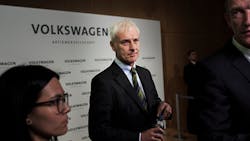With US Lawsuit, Vice Tightens for Volkwagen
FRANKFURT, Germany — The decision by the U.S. government to sue Volkswagen over the massive pollution-cheating scandal turned up the heat on the former paragon of German industry and fueled speculation about how much the affair will finally cost the embattled auto giant.
Three and a half months after VW was plunged into its biggest crisis when it was revealed to have installed software in 11 million diesel engines worldwide that intentionally subverted clean-air regulations, the U.S. government said it would take the carmaker to court over the affair.
Civil penalties in the lawsuit, filed by the U.S. Department of Justice on behalf of the Environmental Protection Agency, could run well above $20 billion, according to the suit.
“The fact that the U.S. Justice Department is getting involved is a surprise, and it is a sign that the U.S. authorities are highly dissatisfied” with the way VW has handled the affair so far, said Ferdinand Dudenhoeffer, expert at the Center for Automotive Research at the university of Duisburg and Essen. “The anger in the United States is tangible. VW can no longer play for time.
The development sparked fears that the U.S. authorities could slap much bigger fines on VW than have previously been expected, with figures of as much as $90 billion circulating in media reports.
That has spooked investors and VW shares — which in recent weeks have managed to regain some of the ground lost since the scandal broke in September — were among the biggest losers on the Frankfurt stock exchange on Tuesday, where they were showing a loss of more than 4%.
But Equinet analyst Holger Schmidt suggested the figure could be exaggerated and would actually come out much lower in the end.
$90 Billion Is 'Unrealistic' ... But $20 Billion Isn't
Dudenhoeffer agreed. “These numbers are completely unrealistic,” he argued.
Until now, most observers had suggested that VW could face fines of up to $18 billion in the United States.
“The U.S. authorities clearly want to set an example,” said another auto industry expert, Stefan Bratzel of the Center of Automotive Management in Bergisch Gladbach. But it was unlikely that VW would be fined the maximum amount, he said.
The final amount was “highly speculative, but it will probably come out in the single-digit billions,” or not more than nine billion dollars, Bratzel said.
Nevertheless, VW is being sued by private customers in the U.S. who are seeking many more billions in possible compensation.
In December, VW announced it has hired U.S. lawyer Kenneth Feinberg to handle the complaints. Feinberg is known for handling large consumer compensation cases such as the deadly ignition switches used in some General Motors cars.
VW is scheduled to start recalling some 8.5 million affected vehicles in Europe this month, which is expected to cost a relatively modest 500 million euros ($536.67 million). But VW is still a long way from reaching an agreement with the U.S. authorities, who exposed the scam in the first place.
“The anti-pollution regulations in the U.S. are a great deal stricter than in Europe, and the easy and inexpensive technical solutions agreed in Europe won’t be sufficient on the other side of the Atlantic,” Bratzel said. “In the extreme case, VW won’t be able to find a technical solution for the U.S. That means that a re-fit would not be viable” and VW would simply have to buy back all the vehicles affected.
Deadline Could Approach
The US authorities could even impose a deadline for VW to find a solution and, if it fails, it would have to withdraw all 600,000 affected vehicles from the roads in the U.S., the expert suggested.
VW itself did not respond directly to the news of the most recent lawsuit, saying simply that it was examining the complaint. And it stressed that it would continue to cooperate closely with the U.S. authorities.
VW’s new chief executive Matthias Mueller is scheduled to travel to the United States next week where he will meet “political leaders,” the group said, without revealing any details.
The so-called “diesel-gate” affair has hit VW’s sales and in a magazine interview last month, Mueller said the carmaker was abandoning its ambition to become the world’s biggest carmaker ahead of Japanese rival Toyota.
By Jean-Michel Hauteville
Copyright Agence France-Presse, 2016
About the Author
Agence France-Presse
Copyright Agence France-Presse, 2002-2025. AFP text, photos, graphics and logos shall not be reproduced, published, broadcast, rewritten for broadcast or publication or redistributed directly or indirectly in any medium. AFP shall not be held liable for any delays, inaccuracies, errors or omissions in any AFP content, or for any actions taken in consequence.
